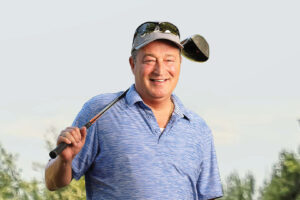In January 2014, 35-year-old Michael Wachter lost control of his vehicle on an icy highway, leaving him with a shattered left collarbone. But following the accident, he didn’t realize he had experienced head trauma. “I was kind of out of it from the accident and the medicine for my collarbone,” he says.
Soon after, however, he noticed his vision had become fuzzy and he just felt “off.” He visited his general practice physician, but a CT scan didn’t reveal any head trauma.
Michael was referred to Michael Greller, MD, a board-certified orthopedic physician with Advanced Orthopedics & Sports Medicine and on staff at CentraState, who soon realized Michael’s symptoms were not from the pain medication he had been taking for his collarbone injury. Michael was then referred to Yih Lin Nien, MD, board-certified neurologist on staff at CentraState, who confirmed he had suffered a concussion.
A concussion is a significant blow to the head that causes a metabolic crisis in the brain, with symptoms such as dizziness, balance issues and vision impairment, according to Brian Mason, PT, DPT, CentraState’s clinical director of rehabilitation services. He adds that about 2,000 concussion cases come into the emergency department at CentraState Medical Center each year.
Michael, who lives in Howell, was referred to the concussion rehabilitation program at CentraState, where he met Heather Murray-Miller, PT, DPT, certified vestibular rehabilitation specialist. “Michael had problems with his vision, such as focusing on objects—especially with head movements—as well as memory, processing and balance,” Murray-Miller says. He also had the additional stress elements of other physical injuries, which can make recovery from concussion take longer.
“Every concussion is different,” Murray-Miller says. “Some are worse than others. In a motor vehicle accident, there doesn’t have to be a hit on the head to cause concussion; the jarring to the brain is enough.”
The combination of complicated issues was especially hard for Michael, an electrical engineer, who was off work for two months after his accident. “You couldn’t do much,” he says. “You’re really kind of trapped in your own head.”
According to Murray-Miller, cognitive testing and training are invaluable when they are applied at the right time. Michael was tested by speech pathologist Marilyn Abrahamson, SLP, to establish his needs and baseline. “The tests help you see how and when you were getting better,” Michael says. “It felt good to be proactive and do something to feel better.”
Equally important was testing of the physical results of concussion. Murray-Miller says Michael’s visual and balance problems improved greatly through weekly vestibular therapy. “They asked me to stand on one leg, which I struggled to do,” he says. “That was the first time I saw that I was not in good shape.”
Murray-Miller says Michael improved steadily with appropriate rest and specific exercises designed to increase his ability to focus, both with his head still and with his head and body moving. She also educated Michael on concussion symptoms and care “so he could be independent in his self-monitoring and seek help when appropriate.”
By late spring, Michael had fully recovered from his concussion, giving a lot of the credit to Murray-Miller and her team. “I can’t say enough about Heather and her team,” he says. “They were excellent.”
Michael is now back to work, but now has a new role to focus on: father. He and his wife, Katie, welcomed their first child, Brian, in June 2014, and a clear head will be more important now than ever.
The neuroscience programs at CentraState offer comprehensive care for brain, spine and nervous system conditions. For more information, visit www.centrastate.com/neuroscience or call 866-CENTRA7 (866-236-8727).





